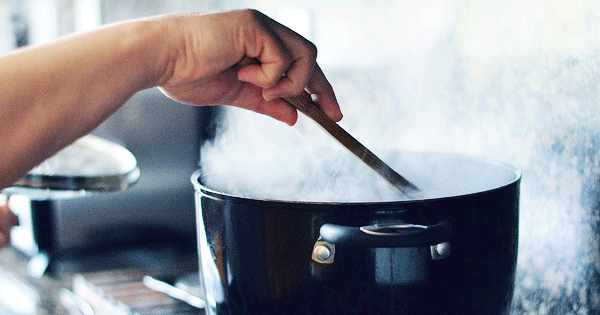Advertisement
It's a good general rule that, if you want to lose weight, you start cooking all your own meals and stop eating out all the time. It makes sense--this way you can monitor exactly what is going on to your plate.
That might not always be the case, though.
According to Yahoo! Health, "A recent study found that the more time middle-aged women spent cooking at home, the more likely they were to suffer from metabolic syndrome." However, "The reason for the finding may be that the study didn’t identify exactly what the women were cooking, so there was no way to measure the healthfulness of their homemade meals."
For example, those findings wouldn't be too surprising if they were making mac 'n cheese with cheeseburgers. But it would be interesting if they were making, say, a vegetable stir fry with brown rice.
Researchers also suggest, on the other hand, that if they are cooking at home they likely are also baking at home, which means they might be eating more cookies and brownies.
The bottom line is that eating at home doesn't always mean eating healthy. Here some four cooking mistakes you might be making.
1. Nibbling while cooking.
We've all done it: it's part of the fun of cooking after all! However, for many, those extra calories can really add up. "Many of my clients start keeping food diaries soon after our first consultation, and some are shocked to discover just how much they eat while prepping and cooking," Cynthia Sass, MPH, RD tells Yahoo! Health. "One client regularly downed a glass of wine (or two) while popping cheese cubes, nuts, or crackers as she prepped. That mindless munching resulted in taking in up to 300-400 extra calories, which is enough to keep her at least two sizes larger than her weight goal."
2. Adding too much cheese.
Cheese is very calorie-rich, which means that you can easily overdo it. "I recently challenged a client to go 30 days without eating cheese, because I knew it would be a major key to her success," Sass says. "She, like many other people I counsel, was using far too much cheese in home-cooked meals, and as a result, she was racking up hundreds of surplus calories." Don't want to give up cheese? Try measuring it out to see how much you're really adding to your dish.
3. Carb overload!
"Many health-conscious people I talk to have given up white bread and pasta in favor of healthy starches, like quinoa, wild rice, and lentils. The swap is fantastic for your health, but eating excess portions of these superfoods can still prevent weight loss, or lead to weight gain." That doesn't mean you should throw out carbs altogether--they are good for you--but you should watch your portions. "If you’ll mostly be sitting in the evening, your portion of anything starchy should be somewhere between a half cup to a cup (more if you’re younger, taller, and more physically active; less if you’re older, shorter, and exercise less)," Sass explains. "I know that seems tiny, but when combined with a generous portion of veggies (think two cups, or the size of two tennis balls) along with lean protein and a bit of healthy fat, it’s completely doable."
4. Indulging your sweet-tooth too often.
"Over the years, many clients have told me that they just need a little something sweet after dinner," Sass says. "But one cookie can easily turn into three, and one serving of ice cream can easily become the whole pint. And once an after-dinner dessert pattern forms it can be challenging to break." A lot of need for sweets comes from a need for emotional comfort. Try, instead, to find comfort in other things like a hug from your significant other or a nice warm blanket and a movie. "If you really just need a treat," Sass says, "opt for a few tasting squares of dark chocolate, or make room for occasional desserts by cutting the carbs and fat in your meal, which is what most desserts are made from."
What do you think about these cooking tips? Let us know what you think in the comments!
Photo Copyright © 2012 nicoleabalde/Flickr




